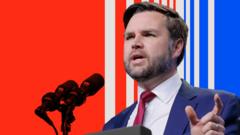JD Vance's recent statements and actions highlight a provocative redefinition of US foreign policy, merging personal beliefs with the populist sentiments of the Trump administration.
JD Vance's Global Perspective: A Shift in American Foreign Policy

JD Vance's Global Perspective: A Shift in American Foreign Policy
How the Vice President's Ideology Reflects Trump's 'America First' Stance
In a notable appearance at the Munich Security Conference, US Vice President JD Vance surprised many by downplaying the ongoing conflict in Ukraine, a pivotal issue in American foreign policy. Instead of delivering a strong condemnation or support, he directed his criticisms towards European allies, accusing them of being out of touch with their citizens and described their response to immigration as anti-democratic. "If you are running in fear of your own voters, there is nothing America can do for you," he asserted, a reflection of his "America First" ideology, which resituates American workers at the heart of global discourse.
This aggressive approach soon led to tensions with Ukrainian President Volodymyr Zelensky, whom Vance chastised for perceived ingratitude towards American support. Such confrontations are emblematic of Vance's alignment with a faction of the Republican Party that resonates with Trump's foreign policy strategy, prioritizing national interests over traditional diplomatic niceties. His shift from a one-time critic of Trump to a leading figure of Trumpism has been marked by a pragmatic belief that the concerns of ordinary Americans should dictate US foreign policy—a sentiment that has arisen amid disillusionment with political elitism.
Academics close to Vance describe him as a pragmatist instead of a strict ideologue. His speeches convey a nuanced understanding of the interplay between global elites, domestic survival, and the perception of America's role in the world. "America is not just an idea… America is a nation," he emphasizes, invoking his familial ties to a particular heritage he believes should shape national priorities. This sentiment sometimes drifts into perceptions of nativism—a belief that prioritizes the interests of established Americans over newcomers—which has raised concerns within the broader conservative community about its implications for the country’s foundational immigrant ethos.
Vance's comments extend beyond immigration and critique of Ukraine, reflecting skepticism about the US’s obligations overseas, particularly in light of the spending associated with the war. His remarks have sparked outrage among European leaders, perhaps revealing a recalibration of American diplomatic relationships under his vice-presidency. Critics warn such views neglect the complexities of global alliances and the entangled nature of modern international conflicts.
Overall, JD Vance represents a powerful convergence of traditional values with a populist reimagining of American foreign policy. His provocative stance suggests a significant transformation in how America might engage with the world, a stark contrast to previous administrations. Whether this approach will yield the intended support from core constituencies or alienate traditional allies remains to be seen, but Vance’s trajectory underscores a fundamental shift in the Republican Party's priorities as they navigate the complexities of a changing global landscape.
This aggressive approach soon led to tensions with Ukrainian President Volodymyr Zelensky, whom Vance chastised for perceived ingratitude towards American support. Such confrontations are emblematic of Vance's alignment with a faction of the Republican Party that resonates with Trump's foreign policy strategy, prioritizing national interests over traditional diplomatic niceties. His shift from a one-time critic of Trump to a leading figure of Trumpism has been marked by a pragmatic belief that the concerns of ordinary Americans should dictate US foreign policy—a sentiment that has arisen amid disillusionment with political elitism.
Academics close to Vance describe him as a pragmatist instead of a strict ideologue. His speeches convey a nuanced understanding of the interplay between global elites, domestic survival, and the perception of America's role in the world. "America is not just an idea… America is a nation," he emphasizes, invoking his familial ties to a particular heritage he believes should shape national priorities. This sentiment sometimes drifts into perceptions of nativism—a belief that prioritizes the interests of established Americans over newcomers—which has raised concerns within the broader conservative community about its implications for the country’s foundational immigrant ethos.
Vance's comments extend beyond immigration and critique of Ukraine, reflecting skepticism about the US’s obligations overseas, particularly in light of the spending associated with the war. His remarks have sparked outrage among European leaders, perhaps revealing a recalibration of American diplomatic relationships under his vice-presidency. Critics warn such views neglect the complexities of global alliances and the entangled nature of modern international conflicts.
Overall, JD Vance represents a powerful convergence of traditional values with a populist reimagining of American foreign policy. His provocative stance suggests a significant transformation in how America might engage with the world, a stark contrast to previous administrations. Whether this approach will yield the intended support from core constituencies or alienate traditional allies remains to be seen, but Vance’s trajectory underscores a fundamental shift in the Republican Party's priorities as they navigate the complexities of a changing global landscape.




















